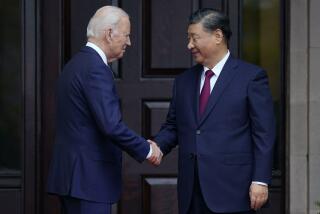China’s Xi urges Trump to use caution in handling North Korea

As North Korea marks the founding anniversary of its military on April 25, South Korea and its allies are bracing for the possibility that it could conduct another nuclear test. (Sign up for our free video newsletter here http://bit.ly/2n6VKPR)
Reporting from BEIJING — Chinese leader Xi Jinping on Monday implored President Trump to show restraint toward North Korea, repeating a plea for patience amid signs the isolated nation is preparing for another nuclear test.
The two spoke by phone for the second time this month, and following a face-to-face meeting in Florida. Trump has urged Xi to exert more pressure on North Korea, which depends largely on its neighbor for economic survival. China insists Washington should do its part to defuse tension over the North’s nuclear ambitions by embracing talks.
China is “firmly opposed to any violations of the U.N. Security Council resolutions,” Xi said, according to a Chinese Foreign Ministry statement, and is willing to work with the United States.
He also emphasized “hope that all sides exercise restraint and avoid intensifying the situation on the peninsula. Only when each side takes responsibility and works together, can we solve the nuclear issue.”
The White House issued a statement confirming the two leaders spoke about North Korea, but mentioned nothing about Xi cautioning restraint.
“President Trump criticized North Korea’s continued belligerence and emphasized that Pyongyang’s actions are destabilizing the Korean peninsula,” the statement said. It added that Trump and Xi “committed to strengthen coordination in achieving the denuclearization of the Korean peninsula.”
The Trump administration has warned that all options, including military action, are “on the table” should Pyongyang attempt its sixth nuclear test. North Korea celebrates the 85th anniversary of its army’s founding Tuesday and likes to mark such occasions with displays of its power.
Trump also spoke with Japanese Prime Minister Shinzo Abe on Monday as Japanese destroyers began naval drills with the U.S. aircraft carrier Carl Vinson.
“We agreed to strongly demand that North Korea, which is repeating its provocation, show restraint,” Abe told reporters.
A White House statement said only that the two leaders addressed “a range of regional and global issues of mutual concern.”
U.S. officials earlier said the aircraft carrier was headed toward the Korean peninsula, when it was actually going in the opposite direction. Now — according to Vice President Mike Pence, who visited Japan last week — it’s headed the right way.
China is increasingly worried the standoff between the U.S. and North Korea could spiral out of control, resulting in a cascade of refugees on its border and the collapse of a buffer region between it and a democratic South Korea.
“The fact that the two leaders communicated at this point is important,” said Zhang Liangui, a North Korea expert at the Communist Party’s Central Party School in Beijing. “It seems that the view from China and the U.S. on the Korean peninsula is getting closer.”
North Korea ratcheted up tensions Sunday when it reportedly detained a third American citizen, a teacher at Pyongyang University of Science and Technology. The state-run media declared the nation ready to sink the U.S. aircraft carrier.
Analysts had predicted a nuclear test in mid-April to coincide with the birthday of the nation’s late founder, Kim Il Sung. His grandson, current leader Kim Jong Un, instead flubbed a missile launch.
But Washington and South Korea believe the North is inching closer toward creating an intercontinental ballistic missile that could reach the United States. Even China, which has long sought to balance its North Korean alliance with global demands to act, has taken a more defiant tone.
China suspended coal imports this year, and a Communist Party-run newspaper has warned the country might cut off oil shipments should the North conduct a nuclear test.
The state-run Korean Central News Agency on Friday implied that China was “dancing to the tune” of the United States. China’s Global Times newspaper, a Communist Party mouthpiece, shot back.
North Korea’s “nuclear program has severely impacted peace and stability in northeast Asia, jeopardizing China’s major national interests,” the paper said Monday in an unusually fierce attack.
“Preventing Pyongyang from continuing to develop nuclear weapons has already become Beijing’s priority in northeast Asian policies.”
Nicole Liu in The Times’ Beijing bureau contributed to this report.
Meyers is a special correspondent.
Twitter: @jessicameyers
ALSO
Trump to China: Help us rein in North Korea and we’ll back off on trade issues
If there’s debris and destruction, it must be springtime in Beijing
More to Read
Sign up for Essential California
The most important California stories and recommendations in your inbox every morning.
You may occasionally receive promotional content from the Los Angeles Times.










